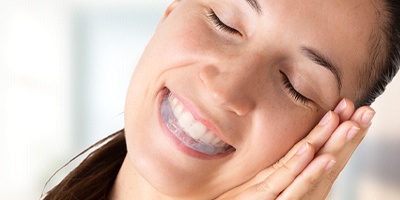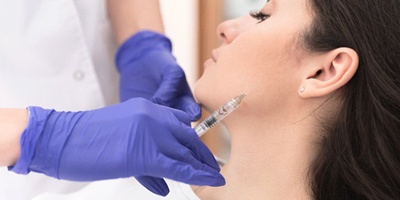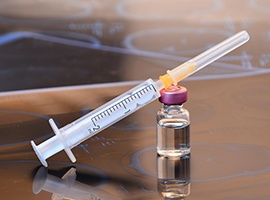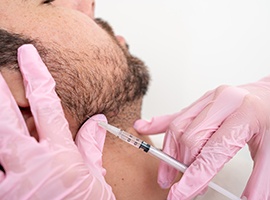TMJ Therapy – Fair Oaks, CS
Find Relief from Persistent Jaw Pain

It is estimated that between 5% and 12% of people suffer from temporomandibular joint dysfunction (TMD). This condition, which is also commonly referred to by the name of the joint that it affects, the TMJ, can result in persistent pain and interfere with your quality of life. If you suspect that you are suffering from it, we invite you to visit our practice for a consultation. We offer several treatments that may be able to relieve your pain and get your jaw’s health back on track.
Why Choose Sheng Ji, DDS, MD Oral & Maxillofacial Surgery for TMJ Therapy?
- Highly Experienced Doctor
- Multiple Therapies Available
- Friendly and Skilled Team
What Is TMJ Dysfunction?

TMD is a term that refers to a range of problems that can afflict the TMJ. Your TMJ is the joint just in front of your ears that connects your mandible (lower jaw) to the rest of your skull. It is one of the most used joints in the human body, and its construction is complex. When it is not functioning as it should, it can result in pain and a range of other unpleasant symptoms.
Symptoms of TMJ Dysfunction

Some of the most common symptoms of TMD include:
- Jaw pain
- The sensation of lock jaw
- Pain when chewing
- Facial soreness
- Hearing issues
- Headaches and migraines
- Various musculoskeletal problems
- Dizziness
- Teeth grinding and clenching
Because TMD can cause so many symptoms, some of which are not near the jaw joint, it is often misdiagnosed. If you think you might have this condition, it is important that you seek care from an oral surgery practice or dentist in Fair Oaks who has the training and experience necessary to address it.
Treatment for TMJ Dysfunction

The best treatment for TMD can vary between patients. Before making any treatment recommendations, Dr. Ji will examine your oral structures and learn as much as possible about your symptoms. Knowing about both your oral health and lifestyle can help him determine which type of TMJ therapy would be best for you. After he completes his initial evaluation, Dr. Ji may recommend one or more of the following:
Occlusal Splint

An occlusal splint is a removable dental device that fits over your teeth. It can prevent grinding and clenching and relieve some of the pressure on your TMJ. There are several different types of splints, including ones that you can buy over the counter. However, OTC devices are not recommended because they do not have the exact fit that is necessary for effective treatment.
Equilibration/Occlusal Adjustment

TMD often results when the upper and lower teeth do not fit together properly. This places extra stress on the TMJ. An occlusal adjustment, also called equilibration, involves making minor changes to the structure of the teeth so they work more harmoniously together. It may also call for adjustments to the biting surfaces of any crowns or bridges that you have.
Treatment with a TENS Machine

A TENS machine is a small device that uses electrical currents to flood the nervous system, reducing its capacity to send pain signals to the brain. It can also help to reduce the tension in the muscles surrounding the TMJ. The machine creates a pleasant tingling or prickling sensation on the skin and presents almost no risks.
BOTOX for TMJ Treatment

BOTOX is famous as a cosmetic treatment, but it actually has some amazing medical applications as well! For example, precisely placed injections can prevent unnecessary movements in the facial muscles around your TMJs, helping them to relax. One study even found that up to 90% of patients who underwent BOTOX therapy for TMD found significant relief from their symptoms. Just how does BOTOX work as a TMJ treatment, and how can it complement other effective therapies? Continue reading below to discover some relevant details.
What Is BOTOX?

BOTOX is the brand name of a diluted form of botulinum toxin, which is derived from a bacterium called Clostridium botulinum. While the word “toxin” might seem a little scary, BOTOX is nothing to be afraid of. When it is properly injected into the muscles around the jaw, it can temporarily limit their movements. This forces them to relax. In turn, this can reduce tension in the surrounding tissues, resulting in a significant reduction of TMJ-related pain.
Results of BOTOX injections usually become very noticeable 5 – 10 days after treatment, and the pain relief may last for several months at a time.
Are You a Good Candidate for BOTOX for TMJ Treatment?

You might be a suitable candidate for BOTOX if you are experiencing common symptoms of TMJ disorder, such as jaw pain, limited jaw mobility, headaches, difficulty chewing, and more. It can be especially helpful for individuals whose TMD is related to bruxism (teeth grinding and clenching).
Of course, it is important to keep in mind that BOTOX does not really treat the root cause of TMD. Rather, it is a means of symptom relief. It is best to combine it with other therapies that are designed to address underlying issues and produce long-term results.
After a thorough evaluation, Dr. Ji can let you know if BOTOX would be a suitable treatment for your unique circumstances.
How Can BOTOX Treat TMJ Disorder?

BOTOX has the potential to significantly reduce the pain and discomfort of TMD. It also offers a fast and easy treatment process. A round of injections may take anywhere from 20 – 60 minutes, and there is no downtime afterward, so you can feel free to get right back to your normal routine. You may start to notice results within a few days, but it may take up to a week or longer for the full effects to become apparent. Some patients return for additional injections every 3 – 4 months.
TMJ Therapy FAQs
Can TMJ Disorder Be Cured Permanently?
For some people, their TMD symptoms disappear on their own. However, they may come back if the underlying cause is not addressed. In our practice, we try to take a two-fold approach to this disorder. We hope to get you out of pain as quickly as possible, which may involve BOTOX injections and/or TENS therapy. Those treatments can relax the facial muscles and reduce discomfort, though they are usually not permanent.
We may also recommend other treatments, which address the root causes of TMD. This can involve equilibration, occlusal splints, or in some cases, surgery. These approaches are more likely to provide long-term (possibly permanent) relief.
Is TMJ Treatment Safe?
Most forms of TMJ treatment are very low-risk. Things like TENS therapy and occlusal splints are completely noninvasive and extremely unlikely to cause severe, adverse side effects. BOTOX injections may cause mild side effects, but as long as they are administered by a well-trained professional, they are also considered to be quite safe.
Corrective jaw surgery is higher-risk due to its invasive nature. However, you can be confident in the skills of Dr. Ji and our team. The vast majority of the procedures that we perform are successful!
How Long Does TMJ Treatment Take?
The timeline for TMJ treatment can vary. It really depends on what is causing the problem and how well you comply with recommended therapies.
For example, TENS therapy can provide immediate pain relief, but it is unlikely to last if it is not used in conjunction with other treatments. Jaw exercises may take a bit of time to lead to improvements, which can last long-term if you are consistent.
Ask our team about when you can reasonably expect to start noticing a reduction in your symptoms. We cannot make any guarantees, but we can provide estimates based on our knowledge and the experiences of other patients.
Can TMJ Be Treated Without Surgery?
In many cases, yes, TMD can be addressed without surgery. We strive to favor conservative options whenever possible. Surgery is usually reserved for particularly complex or extreme cases wherein other therapies have proven to be inadequate.
